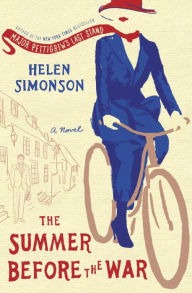Helen Simonson | March 2016 LibraryReads Author

Photo by Nina Subin
Author Simonson’s much-anticipated second book (after her 2010 debut, Major Pettigrew’s Last Stand), set in the summer of 1914 as World War I looms, is the LibraryReads top pick for March 2016 as well as an LJ Editors’ Spring Pick (ow.ly/YVVEg). The UK-born Brooklyn resident kindly agreed to answer a few email questions about The Summer Before the War.
You’ve lived for more than three decades in the United States, but both of your novels are set in England. Have you ever considered writing a book set in your adopted country? I love being an American and a New Yorker, but England, and Sussex in particular, will always be an emotional draw for me. When it came time to write a novel, the chance to spend time in England, at least in my head, was irresistible. I also get to enjoy England through rose-colored lenses. If I were there every day I would have to face the reality of rain and warm beer. So when it comes to Brooklyn, I think I might have to leave for some period of time in order to long for all its incredible urban landscapes and people—without remembering the crowded subway, bearded hipsters, or alternate-side-of-the-street parking! Why the switch from contemporary (Major Pettigrew) to historical? Are you more comfortable in one time period than another? What sort of research did you do? I don’t consider myself a proper historical novelist. I’m just using a historical setting to explore timeless themes (I hope). I did several years of research using memoirs, biographies, history books, and original sources. I spent many weeks at the main New York library, the Library of Congress in Washington, DC, and the British Library. In London, I got to read original magazines and newspapers from 1914 and see how the war became woven into people’s lives, not just in the headlines but in recipes for economical Christmas pudding and the social columns where deaths began to replace marriages and engagements. I’d like to thank all the research librarians who were always so helpful suggesting bibliographies and pulling material for me. I was amazed that all their help was free with a library card—the highest measure of civilization. Your depiction of the Gypsies in Rye and how they’re treated by the townspeople is touching and perceptive. Was there a Romany community in Rye upon which you based your characters? What made you include the Romany community in this story? In recent years I have become aware of the Roma as an ethnic minority that has been persecuted across the world for a thousand years. [The Roma are] routinely dismissed in quick stereotypes and always spoken of as a group. Even the most tolerant people I know tend to think of “Gypsies” in a negative light. We would not dream of speaking of any other ethnic or religious group so harshly. In my story, I hoped to highlight that the English Romanies have been a part of local history as long as anyone else and that Romany men served their country in the war alongside their fellow British men. Were any of the characters in Summer based on people you know, or on historical figures? The only character based on a real [historical] figure might have been the writer Mr. Tillingham. I have read much about Henry James and adore his work. In this book, I might have had the Cher Maître very loosely in mind as I made up Mr. Tillingham. But it being fiction, I was able to take scurrilous liberties. He was the easiest character to write and provided me with much comic relief during difficult times with the rest of the cast. Did any of your forefathers see combat? My maternal grandfather was a batman (an officer’s servant) in World War I. He never spoke of his service, and my mother could tell me only that she thought my grandfather’s officer was killed at the Somme. She has one photo of my grandfather in a uniform that looks a little large for his skinny frame. He and my grandmother were married in 1918, at the end of the war. Did your time in the ad industry help your writing? Advertising taught me to write short, edit hard, and find the unique in any project. I still find that training useful today.
Why the switch from contemporary (Major Pettigrew) to historical? Are you more comfortable in one time period than another? What sort of research did you do? I don’t consider myself a proper historical novelist. I’m just using a historical setting to explore timeless themes (I hope). I did several years of research using memoirs, biographies, history books, and original sources. I spent many weeks at the main New York library, the Library of Congress in Washington, DC, and the British Library. In London, I got to read original magazines and newspapers from 1914 and see how the war became woven into people’s lives, not just in the headlines but in recipes for economical Christmas pudding and the social columns where deaths began to replace marriages and engagements. I’d like to thank all the research librarians who were always so helpful suggesting bibliographies and pulling material for me. I was amazed that all their help was free with a library card—the highest measure of civilization. Your depiction of the Gypsies in Rye and how they’re treated by the townspeople is touching and perceptive. Was there a Romany community in Rye upon which you based your characters? What made you include the Romany community in this story? In recent years I have become aware of the Roma as an ethnic minority that has been persecuted across the world for a thousand years. [The Roma are] routinely dismissed in quick stereotypes and always spoken of as a group. Even the most tolerant people I know tend to think of “Gypsies” in a negative light. We would not dream of speaking of any other ethnic or religious group so harshly. In my story, I hoped to highlight that the English Romanies have been a part of local history as long as anyone else and that Romany men served their country in the war alongside their fellow British men. Were any of the characters in Summer based on people you know, or on historical figures? The only character based on a real [historical] figure might have been the writer Mr. Tillingham. I have read much about Henry James and adore his work. In this book, I might have had the Cher Maître very loosely in mind as I made up Mr. Tillingham. But it being fiction, I was able to take scurrilous liberties. He was the easiest character to write and provided me with much comic relief during difficult times with the rest of the cast. Did any of your forefathers see combat? My maternal grandfather was a batman (an officer’s servant) in World War I. He never spoke of his service, and my mother could tell me only that she thought my grandfather’s officer was killed at the Somme. She has one photo of my grandfather in a uniform that looks a little large for his skinny frame. He and my grandmother were married in 1918, at the end of the war. Did your time in the ad industry help your writing? Advertising taught me to write short, edit hard, and find the unique in any project. I still find that training useful today.  Created by a group of librarians, LibraryReads offers a monthly list of ten current titles culled from nominations made by librarians nationwide as their favorites. See the March 2016 list at ow.ly/YoPcK and contact libraryreads.org/for-library-staff/ to make your own nomination.
Created by a group of librarians, LibraryReads offers a monthly list of ten current titles culled from nominations made by librarians nationwide as their favorites. See the March 2016 list at ow.ly/YoPcK and contact libraryreads.org/for-library-staff/ to make your own nomination.
RELATED
ALREADY A SUBSCRIBER? LOG IN
We are currently offering this content for free. Sign up now to activate your personal profile, where you can save articles for future viewing









Add Comment :-
Comment Policy: